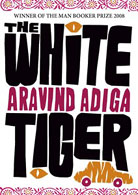 | Reviews of The White Tiger Aravind Adiga Penguin 2008 |
[This novel won the 2008 Man Booker Prize, and has been shortlisted in the Best First Book category for the South East Asia and the Pacific region of the 2009 Commonwealth Writers' Prize.]
From the publisher's page:
Meet Balram Halwai, the 'White Tiger': servant, philosopher, entrepreneur, murderer... Born in a village in the dark heart of India, the son of a rickshaw puller, Balram is taken out of school by his family and put to work in a teashop. As he crushes coal and wipes tables, he nurses a dream of escape.ReviewsHis big chance comes when a rich village landlord hires him as a chauffeur for his son. Arriving in Delhi with his new master, Balram's re-education begins, as he learns of a new morality at the heart of a new India. As the other servants flick through the pages of Murder Weekly, Balram begins to see how the Tiger might escape his cage. For surely any successful man must spill a little blood on his way to the top?
The White Tiger is a tale of two Indias. Balram's journey from the darkness of village life to the light of entrepreneurial success is utterly amoral, brilliantly irreverent, deeply endearing and altogether unforgettable.
Adam Lively in "The Times": "At first, this novel seems like a straightforward pulled-up-by-your-bootstraps tale, albeit given a dazzling twist by the narrator's sharp and satirical eye for the realities of life for India's poor. ('In the old days there were 1,000 castes...in India. These days, there are just two castes: Men with Big Bellies, and Men with Small Bellies.') But as the narrative draws the reader further in, and darkens, it becomes clear that Adiga is playing a bigger game. For The White Tiger stands at the opposite end of the spectrum of representations of poverty from those images of doe-eyed children that dominate our electronic media -- that sentimentalise poverty and even suggest that there may be something ennobling in it. Halwai's lesson in The White Tiger is that poverty creates monsters, and he himself is just such a monster."
David Mattin in "The Independent": "Adiga's plot is somewhat predictable -- the murder that is committed is the one that readers will expect throughout -- but The White Tiger suffers little for this fault. Caught up in Balram's world -- and his wonderful turn of phrase -- the pages turn themselves. Brimming with idiosyncrasy, sarcastic, cunning, and often hilarious, Balram is reminiscent of the endless talkers that populate the novels of the great Czech novelist Bohumil Hrabal. Inventing such a character is no small feat for a first-time novelist."
Peter Robins in "The Telegraph": "The White Tiger is a furious and brutally effective counterblast to smug 'India is shining' rhetoric -- that particular slogan is never mentioned, but the election it lost is crucial to the plot -- which also directs hard, well-aimed kicks at hypocrisy and thuggery on the traditionalist Indian Left...It is certain of its mission, and pursues it with an undeviating determination you wouldn't expect in a first novel. It reads at a tremendous clip."
"The Complete Review" website gave the book a B-: "Yes, The White Tiger 'says a lot' about contemporary India, but it tries to do so far too hard. Adiga has some talent, but leaves it at loose ends here. What suspense he builds up early on surrounding Balram's crime dissipates far too fast, while he tries too hard with his Indian panorama. And Balram isn't a fully realised or convincing character, either, even though he's talking (or telling his story) all the time, as Adiga's attempt to make him both a peasant-everyman (representative of so many Indians) and a white tiger confuses things."
S. Prasannarajan in "India Today": "The White Tiger is a novel born in that infinitesimal moment of darkness. And as a debut, it marks the arrival of a storyteller who strikes a fine balance between the sociology of the wretched place he has chosen as home and the twisted humanism of the outcast...With detached, scatological precision, he surveys the grey remoteness of an India where the dispossessed and the privileged are not steeped in the stereotypes of struggle and domination. The ruthlessness of power and survival assumes a million moral ambiguities in this novel powered by an India where Bangalore is built on Bihar."
Short notices
Richard Marcus in "BlogCritics" magazine: "In the end, what makes the events in the book so believable is the character of Balram. He is the perfect servant. He worries whether his master is eating enough, takes pride in him when he behaves honourably, and is disappointed with him when he is weak. For all his protestations about the system, he is still as much a part of it as anybody else, and it takes an enormous amount of strength and luck for him to live up to his name of white tiger."
"The Economist": "In creating a character who is both witty and psychopathic, Mr Adiga has produced a hero almost as memorable as Pip, proving himself the Charles Dickens of the call-centre generation."
Interviews
Arthur J Pais in "Rediff".
Stuart Jeffries in "The Guardian".
Man Booker page.
Rebecca Yolland on "Untitled Books".
Other
The author's website contains a large number of links to other material about the author and his work.
